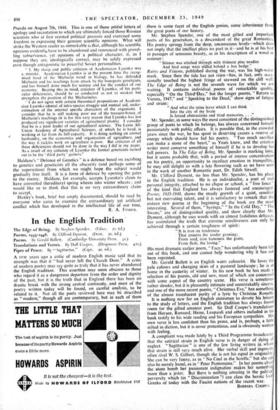In the English Tradition •
425.) A FEw years ago a critic of modern English music said that its strength was that it " had never left the Church Door." A critic of modern poetry may say quite as truly that it has never abandoned the English tradition. This assertion may seem obscure to those who regard it as a dangerous departure from the order and dignity of the past, but it is the truth that in England there has been no drastic break with the strong central continuity, and most of the poetry written today will be found, on careful analysis, to be related to it. Not all the poets reviewed here may be described as " modern," though all are contemporary, but in each of them there is some facet of the English• genius, some inheritance from the great poets of our history.
Mr. Stephen Spender, one of the most gifted and important poets of his generation, is a descendant of the great Romantics His poetry springs from the deep, unconscious levels—which dues not imply that the intellect plays no part in it—and he is at his best in passages of sensuous beauty, as in his description of a wood In Summer :
"Silence was stitched thiough with thinnest pine needles And bird songs were stifled behind a hot hedge."
Ruins and Visions, published during the war, was his high-water mark. Since then the tide has not risen—has, in fact, only occa- sionally touched the highest fringe of seaweed on the cliff wall. The Edge of Being is not the seventh wave for which we are waiting. It contains individual ._poems of remarkable quality, especially " On the Third' Day," but the longer poems, " Return to Vienna, 1947," and " Speaking to the Dead," show signs of fatigue and strain:
" And what the ruins leave which I can think Into the city of my brain Is forced abstractioni and tired memories...."
Mr. Spender, in some ways the most consistent of the distinguished group of poets to which he belongs, has always concerned himself passionately with public affairs. It is possible that, in the crowded years since the war, he has spent in deserving causes a reserve of energy which should have fed his poetry. " Too much sacrifice can make a stone of the heart," as Yeats knew, and the creati■st writer must conserve something of himself if he is to develop hi, full powers. In The Edge of Being, Mr. Spender is marking time, but it seems probable that, with a period of intense concentration on his poetry, an opportunity to recollect emotion in tranquillity, he may still delight us with a late flowering such as we have seen in the work of another Romantic poet, Dr. Edith Sitwell.
Mr. Clifford Dyment, no less than Mr. Spender, has his place in the English tradition. He is an individualist, a poet of real personal integrity, attached to no clique or school, a " free lance'. of the kind that England has always fostered and encouraged Poems, 1935-1948, shows the steady growth of a quiet, sensitise but not enervating talent, and it is satisfactory to remark that the sixteen new poems at the beginning of the book are the most interesting. Several of them, " Syringa," " In the Cold Day," " The Swans," are of distinguished quality, and show clearly that Mr. Dyment, although he uses words with an almost fastidious delicacy. has assimilated the truth that extreme sensitiveness can only be achieved through a certain toughness of spirit: " It is iron on tenderness
That ensures the tender growing: From seed, iron hammers the grain,
From flesh, the loving."
His most dramatic earlier poem, " Face," has unfortunately been left out of this book, and one cannot help wondering why it has not been reprinted. Mr. Gerald Bullett is an English water colourist. He loves the pale colours and changing skies of a pastoral landscape ; he is at home in the austerity of winter. In his new book he has made a selection of his poems, old and new, most of which are concerned with some aspect of the country scene. His verse is sometimes rather slender, but it is pleasantly intimate and unmistakably sincere, and one of the more recent poems, "Christmas Eve," has something of the almost translucent purity of a lyric by Christina Rossetti. It is nothing new for an English statesman to devote his leisure to the study of letters, and the English tradition has always found room for the gifted amateur poet. Sir Duff Cooper's translations from Horace, Ronsard, Heine, Leopardi and others included in his book testify to his wide reading and his European sympathies. His own verse is less confident than his prose, and is, perhaps, a little stilted in diction, but it is never pretentious, and is obviously written with feeling. A complaint was made lately by a Third Programme broadcaster that the satirical strain in English verse is in danger of dying of neglect. " Sagittarius " is one of the few living writers in whom that strain is still very much alive. Her verbal skill and ingenuity often rival W. S. Gilbert, though she is not his equal in originality. She can be very funny, as in " No Coal in the Scuttle," but she cat also be merely banal, as in "Peter Pantomime." In her poems about the atom bomb her passionate indignation makes her something more than a jester. But there is nothing amusing in the ()Oita perversity which (in " Discrimination ") can class the heroic 100 Greeks of today with the Fascist nations of the recent war. BARBARA COOPT1


































 Previous page
Previous page